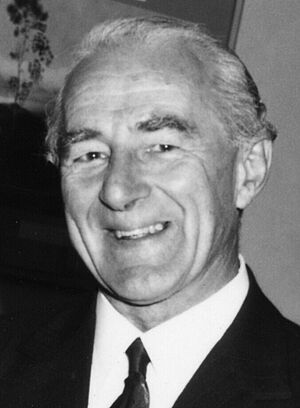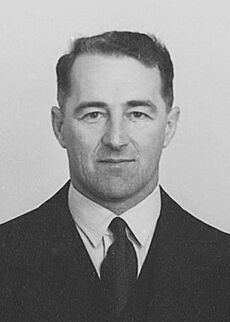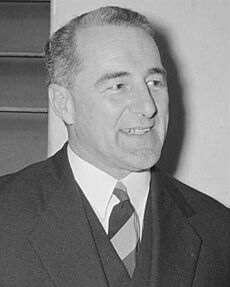Jack Marshall facts for kids
Quick facts for kids
Sir Jack Marshall
GBE CH ED
|
|
|---|---|

Marshall in 1972
|
|
| 28th Prime Minister of New Zealand | |
| In office 7 February 1972 – 8 December 1972 |
|
| Monarch | Elizabeth II |
| Governor General | The Lord Porritt Sir Denis Blundell |
| Deputy | Robert Muldoon |
| Preceded by | Keith Holyoake |
| Succeeded by | Norman Kirk |
| 4th Leader of the National Party | |
| In office 7 February 1972 – 9 July 1974 |
|
| Deputy | Robert Muldoon |
| Preceded by | Keith Holyoake |
| Succeeded by | Robert Muldoon |
| 1st Minister of Overseas Trade | |
| In office 12 December 1960 – 9 February 1972 |
|
| Prime Minister | Keith Holyoake |
| Succeeded by | Brian Talboys |
| 2nd Deputy Prime Minister of New Zealand | |
| In office 12 December 1960 – 7 February 1972 |
|
| Prime Minister | Keith Holyoake |
| Preceded by | Jerry Skinner |
| Succeeded by | Robert Muldoon |
| In office 20 September 1957 – 12 December 1957 |
|
| Prime Minister | Keith Holyoake |
| Preceded by | Keith Holyoake |
| Succeeded by | Jerry Skinner |
| 32nd Minister of Justice | |
| In office 26 November 1954 – 12 December 1957 |
|
| Prime Minister | Sidney Holland Keith Holyoake |
| Preceded by | Clifton Webb |
| Succeeded by | Rex Mason |
| 16th Minister of Health | |
| In office 19 September 1951 – 26 November 1954 |
|
| Prime Minister | Sidney Holland |
| Preceded by | Jack Watts |
| Succeeded by | Ralph Hanan |
| 7th Minister of Statistics | |
| In office 13 December 1949 – 19 September 1951 |
|
| Prime Minister | Sidney Holland |
| Preceded by | Walter Nash |
| Succeeded by | Jack Watts |
| Member of the New Zealand Parliament for Karori Mount Victoria (1946–1954) |
|
| In office 27 November 1946 – 29 November 1975 |
|
| Preceded by | Electorate established |
| Succeeded by | Hugh Templeton |
| Personal details | |
| Born |
John Ross Marshall
5 March 1912 Wellington, New Zealand |
| Died | 30 August 1988 (aged 76) Snape, Suffolk, England |
| Political party | National |
| Spouse |
Jessie Margaret Livingston
(m. 1944) |
| Children | 4 |
| Alma mater | Victoria University of Wellington |
| Occupation | Lawyer |
| Military service | |
| Allegiance | New Zealand |
| Branch/service | New Zealand Military Forces |
| Years of service | 1941–1945 |
| Rank | Lieutenant Colonel |
| Unit | 36th Battalion Divisional Cavalry Battalion |
| Battles/wars | World War II |
Sir John Ross Marshall (5 March 1912 – 30 August 1988) was an important New Zealand politician. He was a member of the National Party. He became a Member of Parliament in 1946. Later, he joined the Cabinet (a group of top government ministers) in 1951.
Sir Jack Marshall served as Deputy Prime Minister for twelve years. Then, he became the 28th Prime Minister from February to December 1972. His time as Prime Minister was short. The government he led had been in power for a long time. People felt it was time for a change.
After the Labour Party won the 1972 election, Marshall became the Leader of the Opposition. This meant he led the main party not in power. He wanted to stay as leader of the National Party. However, in 1974, his deputy, Robert Muldoon, challenged him for the leadership and won.
Marshall was known for being very polite and courteous. People sometimes called him Gentleman Jack. He preferred a calm way of dealing with problems. He disliked aggressive political styles. Sometimes, his calm nature was mistaken for weakness. Marshall believed in pragmatism, which means solving problems in a practical way. He did not like politicians who tried to be popular by making big promises (called populism). When he died, he was remembered as "A soft spoken lawyer almost too nice to be a politician."
Contents
Early Life and Education
Jack Marshall was born in Wellington, New Zealand. He grew up in Wellington, Whangārei, and Dunedin. He went to Whangarei Boys' High School and Otago Boys' High School. He was good at sports, especially rugby.
After high school, Marshall studied law at Victoria University College. He earned his law degrees in 1934 and 1935. He also worked part-time in a law office. He was very involved with the Presbyterian Church. He even served as president of the New Zealand Bible Society for a while.
Military Service in World War II
In 1941, during World War II, Marshall joined the New Zealand Military Forces. He trained to become an officer. For his first few years, he served with the 36th Battalion. He was stationed in Fiji, Norfolk Island, New Caledonia, and the Solomon Islands. He eventually became a major.
During this time, he also spent five months in the United States. He attended a marine staff school in Virginia. On 29 July 1944, Marshall married Jessie Margaret Livingston, a nurse. They got married while he was on leave in Perth, Western Australia. In early 1945, Marshall moved to Italy. He joined the Divisional Cavalry Battalion. He took part in the battle of the Senio River and helped free Trieste.
Becoming a Member of Parliament
| New Zealand Parliament | ||||
| Years | Term | Electorate | Party | |
| 1946–1949 | 28th | Mount Victoria | National | |
| 1949–1951 | 29th | Mount Victoria | National | |
| 1951–1954 | 30th | Mount Victoria | National | |
| 1954–1957 | 31st | Karori | National | |
| 1957–1960 | 32nd | Karori | National | |
| 1960–1963 | 33rd | Karori | National | |
| 1963–1966 | 34th | Karori | National | |
| 1966–1969 | 35th | Karori | National | |
| 1969–1972 | 36th | Karori | National | |
| 1972–1975 | 37th | Karori | National | |
After the war, Marshall worked as a barrister (a type of lawyer). Soon, he was asked to run for Parliament. He became the National Party's candidate for the new Wellington area called Mt Victoria. He won the seat in the 1946 election.
Marshall's political ideas were a mix of liberal and conservative views. He believed in a society where people owned property. He thought the government should guide society fairly. His strong Christian faith also guided his beliefs.
Serving in the Cabinet
In the 1949 election, Marshall won his seat again. The National Party formed the government, and Sidney Holland became Prime Minister. Marshall was promoted to the Cabinet. He became the Minister of Statistics. He also helped Prime Minister Holland directly.
After the 1951 election, Marshall became the Minister of Health. In the 1954 election, his Mt Victoria seat was removed. He successfully ran for another Wellington area called Karori. After this election, he became the Minister of Justice and Attorney-General. In these roles, he supported keeping the death penalty for murder. He also helped create a separate Court of Appeal.
When Prime Minister Holland became ill, Marshall was part of the group that convinced him to step down. Keith Holyoake became the new Prime Minister. Marshall then became the Deputy Leader of the National Party.
Deputy Prime Minister
Soon after Holyoake became leader, the National Party lost the 1957 election. The Labour Party, led by Walter Nash, won. Marshall became the Deputy Leader of the Opposition.
The Nash government did not last long. Its strong actions to fix an economic crisis were not popular. Marshall later admitted that the previous National government had not acted fast enough to prevent the crisis. Labour lost the 1960 election, and National returned to power.
Marshall became Deputy Prime Minister again. He was given new roles, including Minister of Industries and Commerce and Minister of of Overseas Trade. One of his biggest achievements was signing trade agreements with Australia and the United Kingdom.
Marshall also worked on trade talks when Britain considered joining the European Economic Community (EEC). His polite and friendly nature helped him a lot in these talks. He successfully negotiated for New Zealand to continue selling its farm products to Europe. Marshall also helped solve many disagreements between workers and businesses.
Relations between Marshall and Robert Muldoon, the Minister of Finance, became difficult. Marshall felt Muldoon interfered too much in his work. Marshall was also responsible for setting up the Accident Compensation Corporation. This organization helps people who are injured.
Prime Minister in 1972
On 7 February 1972, Keith Holyoake stepped down as Prime Minister. Marshall competed against Muldoon to become the new leader. Marshall won, and Muldoon became Deputy Prime Minister. Marshall wanted to make changes to the government. He felt it had become stuck and not flexible enough.
However, the public was tired of the National government, which had been in power for a long time. They felt Marshall's changes were not enough. In the 1972 general election, Norman Kirk's Labour Party won by a lot. On 8 December, Marshall had been Prime Minister for less than a year. Kirk became Prime Minister, and Marshall became the Leader of the Opposition.
Leader of the Opposition
Marshall became the Leader of the Opposition in 1972. He decided not to separate his shadow cabinet (the opposition's team of spokespeople) from the rest of his party. This was to encourage party unity. He kept most of his team in the same roles. This showed that National had experience and stability, unlike the new Labour Government.
On 4 July 1974, Marshall learned that a challenge to his leadership was coming. He knew he had lost a lot of support. Marshall resigned, and Muldoon became the party leader. Marshall's quiet and calm style did not work well for an opposition leader. An opposition leader often needs to be more aggressive to challenge the government.
After stepping down as leader, Marshall remained a front-bench politician. He was the Shadow Minister of Overseas Trade. He decided to retire from Parliament in 1975.
Later Life and Legacy
After leaving Parliament, Marshall remained active in the National Party. He was highly respected for his many years of service. At first, Marshall did not say much about Muldoon's actions. However, over time, he became more critical of Muldoon's aggressive personality. He felt Muldoon was too aggressive and controlling.
Marshall wrote his memoirs (his life story in two books). In these books, he was very honest about Muldoon and how he lost the leadership in 1974. Besides his memoirs, Marshall wrote a law book. He also published several children's books about a character called 'Dr Duffer'. He started writing these stories when he was a law student. The first book was published in 1978 and was very popular.
Marshall was involved in many charities and cultural groups. These included the New Zealand Chess Association. He also helped start the New Zealand Portrait Gallery. Many of his later activities were linked to his strong Christian faith. Marshall passed away in Snape, Suffolk, England, on 30 August 1988. He was on his way to Budapest to speak at a world conference for the United Bible Societies. He was survived by his wife and four children.
Honours
In 1953, Marshall received the Queen Elizabeth II Coronation Medal. In 1977, he was given the Queen Elizabeth II Silver Jubilee Medal.
In 1973, Marshall was appointed a Member of the Order of the Companions of Honour. This was to recognise his service as New Zealand Prime Minister. The next year, he was made a Knight Grand Cross of the Order of the British Empire.
In 1992, Margaret, Lady Marshall (his wife), was appointed a Companion of the Queen's Service Order for her community service.
Images for kids
 | Aurelia Browder |
 | Nannie Helen Burroughs |
 | Michelle Alexander |






